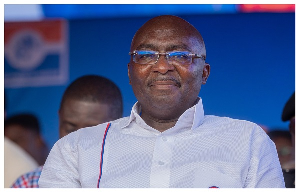It appears that some journalists and members of the opposition NDC are being disingenuous in their criticism of Dr. Mahamudu Bawumia's bid to lead Ghana. All Ghanaians need to be fair in their assessment of Bawumia's position and actions.
Traditionally, the role of the Vice President in Ghana has not been one of absolute executive power. Instead, it has been more ceremonial, with limited executive authority. This has been the case since 1993, until recently, when President Nana Addo Dankwa Akufo-Addo and the NPP allowed Bawumia to take on more prominent roles in the government.
However, this shift does not alter the fundamental responsibilities of a vice president in Ghana. The NPP’s decision to expand Bawumia’s role has even influenced the NDC to delegate more responsibilities to their running mate during their campaign. This suggests that the shift has been beneficial to the vice presidency as a whole.
Critics calling for Bawumia to implement his proposed policies immediately are missing a crucial point. It's important to understand the constitutional limitations of his current role. As of November 2023, Bawumia did not know whether he would become the NPP's flagbearer, as he was still competing with four others for that position. This was around the time when Ghana's 2024 budget had already been presented to and passed by Parliament under the leadership of President Akufo-Addo.
As Vice President, Bawumia does not have direct control or influence over the implementation of the budget, except for specific policies within it that fall under his purview. The expanded role given to him by President Akufo-Addo can be seen as a form of preparation, providing him with valuable experience in governance.
Despite his current limitations, Bawumia has every right to present his vision for Ghana’s future, as any candidate in the upcoming election would. Every presidential candidate is expected to present a manifesto, which serves as a social contract with the people of Ghana. If the current government were expected to implement the manifesto of its flagbearer while still in office, there would be no need to draft a manifesto at all.
It’s surprising that some journalists overlook these key factors and insist that Bawumia should be held accountable for promises he has not yet had the opportunity to act on. According to Ghana’s constitution, a president has four years to fulfil his promises, and it is during this period that he should be held accountable.
Regarding Bawumia's proposals to scrap the e-levy, betting tax, and other forms of taxation, these are part of his broader vision for the country. His willingness to propose changes, even if they differ from the current government’s policies, demonstrates his fo
rward-thinking approach and the type of leadership he aims to offer Ghanaians. Therefore, it is both unfair and inconsistent for sections of the media and the NDC to criticize Bawumia for his manifesto promises, which are meant to form a new social contract with the people of Ghana.
Opinions of Tuesday, 27 August 2024
Columnist: Isaac Ofori



















